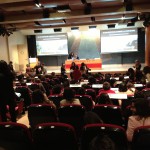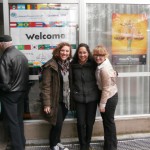With a hundred eyes on her, my 14-year-old student Claudia stood up and gave a brief but rational appeal for the improvement of transportation infrastructure in mountainous landlocked regions. Only by improving transportation, Claudia said, would Nepal be able to meet the second Millennium Development Goal of achieving universal primary education. Around the room, heads nodded in agreement. Were these the same kids who, in October, had trouble finding their country’s GNI because they didn’t understand the concept of income?
Well, they were and they weren’t. For one thing, they were dressed up. One of the most exciting parts of the conference, for the students, is the opportunity to wear fine business dress — in their suits, blazers, pencil skirts, they looked the part of young ambassadors. But of course, the change was more than skin-deep. The students’ growth in critical thinking skills throughout the course of the Global Classrooms program is astounding. Between four mini-conferences (for our youngest students only), two regional conferences (in Torrelavega, Camargo, and Santander), and the «big show» at the Fundación Botín in Santander, our «delegations» took full advantage of the opportunity to speak, debate, and solve global problems in a public forum.
As Fulbrights, we were responsible for running the show. At each conference, several grantees sat on the dais — the three officials who sit at the front of the room and control the flow of debate, the order of speakers, and the voting procedures. It was a hard job, but rewarding. I served as the director of the World Health Organization committee in the Santander conference, and then as the Chair of the UNESCO committee. With over sixty delegations, each wanting to give their 90 speech, it was a challenge to keep the proceedings going and give each student their fair chance to participate. But listening to the students read the resolutions was a rare treat. The WHO recommended ideas as diverse and practical as creating mobile hospital units to serve rural areas in undeveloped countries, creating an international plan to create more water treatment centers in impoverished areas, or creating new prevention and education campaigns for diseases like HIV.
The conferences were the students’ chance to apply their knowledge, but of course the real results happened in the classroom. Our students all studied the Millennium Development Goals, the United Nations’ commitment to ending various problems related to extreme poverty by 2015. Our second year ESO students (ages 13-14) studied education and gender inequality, third year ESO studied global health problems, and fourth year — the Global Classroom experts, in their third year of the program — studied extreme poverty, hunger, and international cooperation. Based on a post-survey I conducted in my classes, 60% of my students said they would almost definitely read an article about the global issues they studied if they came across it in the newspaper. So in addition to developing students’ critical thinking faculties, public speaking abilities, and research skills, Global Classrooms creates global citizens.
Because of the incredible efforts of grantee Michael Hochberg, we were honored by the presence of former United States Ambassador to the UN Sichan Siv. Siv spoke to the students in the opening ceremonies about his experiences as a refugee from the Cambodian killing fields and his rise to one of the most powerful humanitarian posts in the world, and later did an extensive interview with a group of students who had trained at the Fundación Botín for video production and journalism. Something he told us stuck with me after the conference was over; it seemed to capture the spirit of this year’s project perfectly. «When you do well,» he told us, «don’t forget to do good.» Although I fear the grammatical subtleties may have been lost on our youngest students, that quote felt right to me. And I think it’s because I knew that after leading Spain’s future leaders through months of intense study and perspective-taking, we’d prepared them to do just that.

